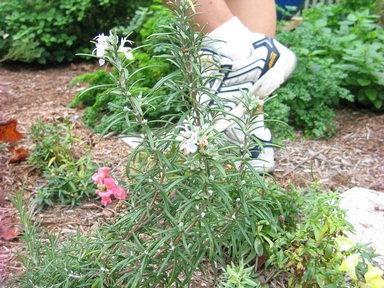Shakespeare proved right after rosemary oil was found to boost memory
It seems William Shakespeare was right all along, after a study revealed memory can be improved by the aroma of rosemary essential oil.
 Shakespeare, way back in the sixteenth century was aware of this as in Hamlet, Ophelia says: "There's rosemary, that's for remembrance: pray you, love, remember."
Shakespeare, way back in the sixteenth century was aware of this as in Hamlet, Ophelia says: "There's rosemary, that's for remembrance: pray you, love, remember."
The new research which was presented this week at the British Psychological Society’s Annual Conference in Harrogate, found the oil could be used to help people remember past events and recall the need to complete tasks in the future.
The study was carried out by Jemma McCready and Dr Mark Moss from the University of Northumbria and saw 66 participants taking tests designed to evaluate their prospective memory functions in rooms diffused with the essential oil.
Dr Mark Moss, head of psychology, said: “We wanted to build on our previous research that indicated rosemary aroma improved long-term memory and mental arithmetic.
"In this study we focused on prospective memory, which involves the ability to remember events that will occur in the future and to remember to complete tasks at particular times, which is critical for everyday functioning. For example, when someone needs to remember to post a birthday card or to take medication at a particular time.”
It was shown that people in a rosemary-scented room performed better with regard to remembering events and being aware of the need to complete tasks at particular times.
Jemma McCready added: “These findings may have implications for treating individuals with memory impairments. It supports our previous research indicating that the aroma of rosemary essential oil can enhance cognitive functioning in healthy adults, here extending to the ability to remember events and to complete tasks in the future.
“Remembering when and where to go and for what reasons underpins everything we do, and we all suffer minor failings that can be frustrating and sometimes dangerous. Further research is needed to investigate if this treatment is useful for older adults who have experienced memory decline.”
Latest News
 29-Jul-24
Dementia Bus gives carehome.co.uk staff insight into life with dementia
29-Jul-24
Dementia Bus gives carehome.co.uk staff insight into life with dementia
 01-Mar-24
Find out the top care homes in 2024
01-Mar-24
Find out the top care homes in 2024
 21-Mar-23
UK's top care homes in 2023 revealed
21-Mar-23
UK's top care homes in 2023 revealed
 03-Jan-23
carehome.co.uk launches free care helpline
03-Jan-23
carehome.co.uk launches free care helpline
 13-Dec-22
5 mins with Emily Whitehurst, chief operating officer for Constantia Healthcare
13-Dec-22
5 mins with Emily Whitehurst, chief operating officer for Constantia Healthcare